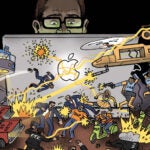 The “one-size-fits-all marketing epitomized by the TV upfronts is out of step with the way people consume media in the market today,” said GE CMO Linda Boff at the second annual AppFronts hosted by General Electric on Thursday in New York City. The event invited 13 apps to pitch themselves to marketers.
The “one-size-fits-all marketing epitomized by the TV upfronts is out of step with the way people consume media in the market today,” said GE CMO Linda Boff at the second annual AppFronts hosted by General Electric on Thursday in New York City. The event invited 13 apps to pitch themselves to marketers.
Even though people “still watch the big screen … it’s really the small one on our phone that gets the lion’s share of attention,” said Boff, pointing to research from Flurry that estimates the average user spends more time in their apps – 198 minutes a day – than they do watching TV (168 minutes per day).
The fact that people still spend two hours and 48 minutes a day viewing TV content belies the notion that TV is dead or dying, although the venue of consumption is undergoing a tectonic shift as cords continue to get cut.
Marketers have been obsessed with millennials for years, but it’s the next generation that really requires the next-gen advertising tactics. Among members of Gen Z, loosely defined as those born in the mid-’90s, 90% watch YouTube on a daily basis, 80% use social media every day, 70% prefer streaming to broadcast and 50% have never even had cable, according to Wildness, AwesomenessTV’s youth marketing research division.
“Television for this generation doesn’t exist – that’s going to be my assumption moving forward,” said Peter Pham, co-founder of Science, the tech incubator responsible for, among other ventures, helping get Dollar Shave Club off the ground and launching Wishbone, an app that allows users to compare and vote on social content.
“Apps are the new television,” he said.
Wishbone has 5 million monthly active users who create 2 million polls per month and cast 55 million votes per day. It’s a 91% female audience that falls right into the 13- to-25-year-old target demo that most marketers are at a loss to reach.
And these users actually do enjoy branded content if it’s presented in the right way – consider the fact that a Taco Bell campaign promoting its new breakfast menu on Wishbone saw two million engagements.
“We’re building the next Viacom,” Phan declared.
But perhaps the point is that there isn’t a “next Viacom.”
The future – really the present – is increasingly about “audience engagement that is intimate and new, user experience that is incredibly human,” said Sam Olstein, GE’s global director of innovation. “But there is also more noise for consumers to shift through. The bar between what is good and what isn’t good is only going to continue to widen.”
None of the apps on stage had anything to say about traditional ad formats, other than that they’re terrible.
“We need to reinvent advertising on a mobile device because, basically, it really sucks,” said Tobi Bauckhage, CEO and co-founder of pop culture entertainment publisher Moviepilot.
In the case of Musical.ly, a lip-syncing and video-sharing app, that means creating campaigns that feel custom to the platform – like encouraging users to upload videos of themselves lip-syncing to Jason Derulo’s new song for a chance to meet the artist in person.
For live game-streaming platform Twitch, that means quirky partnerships like the one with Old Spice, where the brand dropped a man off in the forest and let the Twitch community control his movements for three days, effectively making him into a real-life video game character.
And for smart jewelry company Ringly, which produces Bluetooth-enabled notification rings and bracelets, that means partnerships with the likes of Mastercard that allow customers to make contact-less payments with their baubles.
For the big brands looking to partner with apps and startups, the watchword is “new.” But it’s also about not forgetting what came before, just for the sake of trying to stay on the bleeding edge.
“We like to be there early as explorers in new platforms,” said GE vice chair Beth Comstock. “We have a high premium on whatever is next and new, but we can’t give up on what’s still working.”














